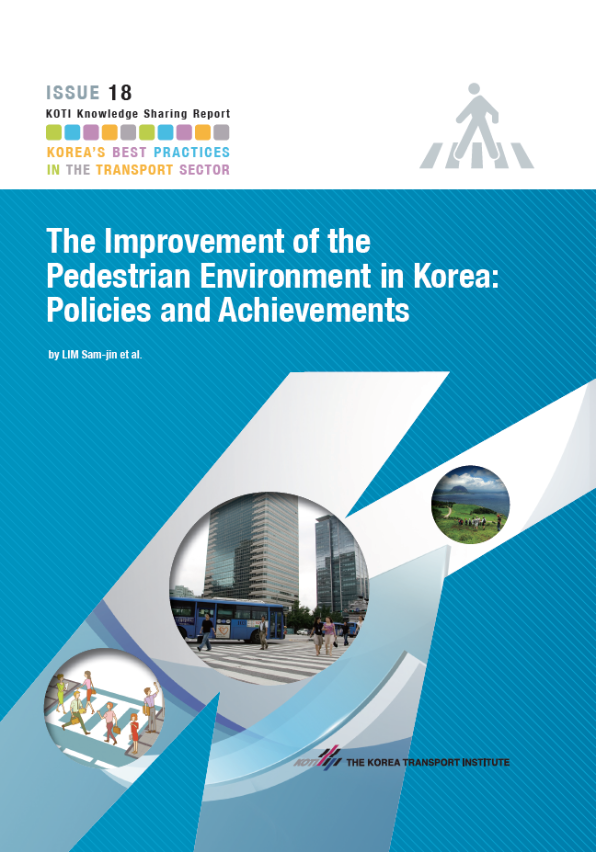Special Report

RESEARCH
KOTI - Korea Transport institute
KOTI Knowledge Sharing Report_Issue 18_The Improvement of the Pedestrian Environment in Korea: Policies and Achievements
- Date
April 30 2015
- Page(s)
207 page(s)
#KOTI
#Pedestrian Environment
#Pedestrian Rights Expansion
#Civic Movements
#Pedestrian Ordinance
#Pe

Editor and Authors • 4
List of Tables • 12
List of Figures • 13
Preface • 16
Chapter 1. Introduction
Section 1. The Value of Walking Seen in a New Point of View • 20
Section 2. From the Birth of Pedestrian Rights to the World’s First Pedestrian Laws: Best Practices for Pedestrian Rights in Korea • 24
Section 3. Effects of Best Practices on Improving Pedestrian Amenities • 27
Section 4. The Scope of the Book • 36
Chapter 2. The History of Pedestrian Rights Expansion in Korea
Section 1. The Formative Stage of Pedestrian Rights (Early 1990s) • 41
Section 2. Expansion of Pedestrian Rights (Late 1990s – Mid-2000s) • 46
Section 3. The Mature Stage of Pedestrians’ Rights (Later Half of the 2000s) • 51
Section 4. Policy Achievements and Future Directions • 56
Chapter 3. Korea’s Second-Rate Pedestrian Environment and Campaigning by Civic Movements
Section 1. Seoul, an “Unwalkable” City • 60
Section 2. Pedestrians as Victims of Fatal Traffic Accidents • 71
Section 3. Campaigns for Pedestrian Rights and Seoul’s Enactment of a Pedestrian Ordinance • 77
Section 4. Public Demand Changes a City and Restores Crosswalks in Gwanghwamun • 87
Section 5. Improvement of the Pedestrian Environment and Significance of Civic Movements • 97
Chapter 4. Enactment of the Pedestrian Ordinance and Twenty-Year History of Walkable Seoul
Section 1. Overview of the Pedestrian Ordinance Enactment • 102
Section 2. Overview of the Pedestrian Ordinance • 105
Section 3. Impact of the Pedestrian Ordinance • 111
Section 4. The 20-Year History of Creating Walkable Seoul • 113
Section 5. 20-Year History of the Walkable Seoul Project: Its Accomplishments and Future Tasks • 124
Chapter 5. Enactment Process and Contents of Pedestrian Safety and Convenience Enhancement Act
Section 1. Achievements of the Enactment of the Pedestrian Safety and Convenience Enhancement Act • 130
Section 2. Summary and Basic Contents of the Pedestrian Act • 133
Section 3. Formulation of Master Plans to Enhance Pedestrian Environment • 136
Section 4. Pedestrian Environment Improvement Zone Project • 140
Section 5. Pedestrian-Only Paths • 145
Section 6. Other Efforts to Secure Pedestrian Rights of Walking • 148
Chapter 6. Best-Practice Cases of Improving the Pedestrian Environment
Section 1. Pedestrian Priority Zone Project • 155
Section 2. Construction Project for Car-Free Streets and Pedestrian-Friendly Green Streets • 161
Section 3. Transit Mall Construction Project • 170
Section 4. Green Parking Project • 175
Section 5. Pedestrian Environment Improvement Construction Projects • 181
Chapter 7. From Right to Culture
Section 1. Jeju Island Olle Trail, Creation of a New Culture of Slow • 188
Section 2. Nationwide Hiking Trail Development Boom • 195
Section 3. Safer and More Convenient City for Pedestrians • 200
List of Tables • 12
List of Figures • 13
Preface • 16
Chapter 1. Introduction
Section 1. The Value of Walking Seen in a New Point of View • 20
Section 2. From the Birth of Pedestrian Rights to the World’s First Pedestrian Laws: Best Practices for Pedestrian Rights in Korea • 24
Section 3. Effects of Best Practices on Improving Pedestrian Amenities • 27
Section 4. The Scope of the Book • 36
Chapter 2. The History of Pedestrian Rights Expansion in Korea
Section 1. The Formative Stage of Pedestrian Rights (Early 1990s) • 41
Section 2. Expansion of Pedestrian Rights (Late 1990s – Mid-2000s) • 46
Section 3. The Mature Stage of Pedestrians’ Rights (Later Half of the 2000s) • 51
Section 4. Policy Achievements and Future Directions • 56
Chapter 3. Korea’s Second-Rate Pedestrian Environment and Campaigning by Civic Movements
Section 1. Seoul, an “Unwalkable” City • 60
Section 2. Pedestrians as Victims of Fatal Traffic Accidents • 71
Section 3. Campaigns for Pedestrian Rights and Seoul’s Enactment of a Pedestrian Ordinance • 77
Section 4. Public Demand Changes a City and Restores Crosswalks in Gwanghwamun • 87
Section 5. Improvement of the Pedestrian Environment and Significance of Civic Movements • 97
Chapter 4. Enactment of the Pedestrian Ordinance and Twenty-Year History of Walkable Seoul
Section 1. Overview of the Pedestrian Ordinance Enactment • 102
Section 2. Overview of the Pedestrian Ordinance • 105
Section 3. Impact of the Pedestrian Ordinance • 111
Section 4. The 20-Year History of Creating Walkable Seoul • 113
Section 5. 20-Year History of the Walkable Seoul Project: Its Accomplishments and Future Tasks • 124
Chapter 5. Enactment Process and Contents of Pedestrian Safety and Convenience Enhancement Act
Section 1. Achievements of the Enactment of the Pedestrian Safety and Convenience Enhancement Act • 130
Section 2. Summary and Basic Contents of the Pedestrian Act • 133
Section 3. Formulation of Master Plans to Enhance Pedestrian Environment • 136
Section 4. Pedestrian Environment Improvement Zone Project • 140
Section 5. Pedestrian-Only Paths • 145
Section 6. Other Efforts to Secure Pedestrian Rights of Walking • 148
Chapter 6. Best-Practice Cases of Improving the Pedestrian Environment
Section 1. Pedestrian Priority Zone Project • 155
Section 2. Construction Project for Car-Free Streets and Pedestrian-Friendly Green Streets • 161
Section 3. Transit Mall Construction Project • 170
Section 4. Green Parking Project • 175
Section 5. Pedestrian Environment Improvement Construction Projects • 181
Chapter 7. From Right to Culture
Section 1. Jeju Island Olle Trail, Creation of a New Culture of Slow • 188
Section 2. Nationwide Hiking Trail Development Boom • 195
Section 3. Safer and More Convenient City for Pedestrians • 200